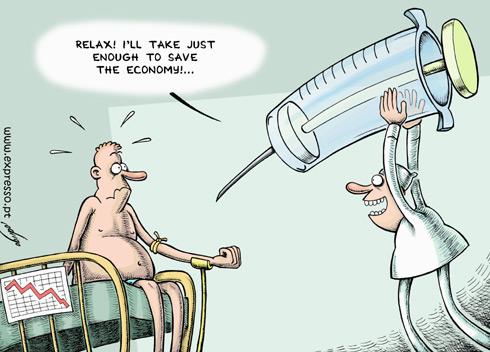It is essential to realize that what makes the economic crisis emerge is the public’s disapproval of the expansionist ventures made possible by the manipulation of the rate of interest…
— Ludwig von Mises
The Major Crisis Is Here!
 So you wish to succeed at marketing in a recession. Well, fine. But first there is something crucial to remember about economics, because the recession we’re talking about is unlike any other.
So you wish to succeed at marketing in a recession. Well, fine. But first there is something crucial to remember about economics, because the recession we’re talking about is unlike any other.
So don’t kid yourself. In the words of Brand Idiomatics, a new normal confronts us.
Bear with me for a moment to consider the root cause of the most massive recession since the Great Depression. It was lots and lots of cheap money…money created literally out of thin air that central banks practically gave away when they drove interest rates to record lows at the start of the millennium, producing an unsustainable global economic boom.
Now we’re facing the correspondingly huge economic bust! What a price to pay!
“It is vain to object that the public favors the policy of cheap money,” says economist Ludwig von Mises, “The masses are misled by the assertions of the pseudo-experts that cheap money can make them prosperous at no expense whatever. They do not realize that investment can be expanded only to the extent that more capital is accumulated by savings.”
But savings take time to accumulate. Americas central bank the Federal Reserve has continued to keep interest rates so near to zero percent that its depositors (big banks) should be lining up 18-wheelers to carry all that cheap money away by the truckload — money they are meant to lend later to your employer and clients to expand business operations the moment the economy shows signs of lasting improvement.
And yet, none of those big banks in fact is lending out a dime!
In this terrible economic climate these banks fear the risk of default. The jig is finally up. This policy of cheap money has hit a brick wall and, as Mises would have predicted, we now have a resulting economic crisis of humongous, unprecedented proportions.
What then is the new normal? What will marketing in a recession require of you? The new normal is a protracted decline in consumer demand well into the future. Marketing in a recession effectively will require that you never forget that this new normal is unavoidable.
In this context, therefore, let’s discuss how to improve marketing in a recession.
The Crisis For The Marketer
Think of it as a marketer. The Brand Idiomatics analysis is based on hard economic data. To make purchases consumers obviously need money to spend. Since the 1980’s consumers depended on 3 sources of wealth to sustain consumption: 1) cheap credit, 2) home equity and 3) a bull market in Wall Street. All three have vanished today for an enormous segment of the population.
Credit access is available only to a select few low risk borrowers. House prices are down by a third with 20% of home owners upside down or approaching foreclosure. The stock market has lost half its value. Is this going to change any time soon? Hardly. People continue to lose their jobs with high income earners sharing a larger share in this loss than any other time since the Great Depression.
Demographics are playing a major factor now with baby boomers arriving to the end of their most lucrative years and finding themselves with a shrunken net worth while approaching the end of their careers. Financial services, media, insurance, big pharmaceuticals and the auto industries have downsized permanently. Put it all together and you’re talking about a new spirit of frugality sweeping the land as consumers become highly cautious and risk-averse about spending. Now that’s a marketing in a recession challenge worth thinking about!
Still not convinced how bad things really are and will continue to become? Then look at the following video. These numbers don’t lie. It should send chills up your spine.
This Great Recession is not a typical incident. At its onset a sitting president called it huge, saying an economic collapse was possible.
Lasting well over 18 months, economist after economist called it the worst slump since the end of WWII. Unemployment surpassed 10%. The following was common place: “Almost all businesses are in survival mode, and they’re slashing payrolls and investments just to conserve cash,” said Mark Zandi, chief economist at Moody’s Economy.com. Consumer confidence plummeted. Sales dropped. And now a double-dip is imminent. Marketing in an on-going recession won’t be easy.
Marketers In A Panic Yet?
 Back in 2009 Aberdeen Group released a report to indicate that nearly 60% of B2B marketers had said that they had planned to keep budgets flat in 2009. This was typical early recession behavior from Marketing. And while one-fifth would decrease them, another fifth would increase them, which was a wash. So most marketing organizations entered the year in a wait and see mode financially.
Back in 2009 Aberdeen Group released a report to indicate that nearly 60% of B2B marketers had said that they had planned to keep budgets flat in 2009. This was typical early recession behavior from Marketing. And while one-fifth would decrease them, another fifth would increase them, which was a wash. So most marketing organizations entered the year in a wait and see mode financially.
But is holding your breath what’s best to do in a crisis of such proportions? What could you do between now and the time youre forced to hit the panic button? It’s not enough to protect the budget. It’s not enough to say you will improve your strategy in general. If you weren’t doing this during the years of plenty, shame on you! You weren’t doing your job.
Marketing in a recession requires careful deliberation but precise, decisive action with little room for error. The lean years do not forgive mistakes. What then should you focus on? What carries the most impact and is feasible to accomplish in a crunch? Judging by Aberdeens study you should focus on marketing process optimization for lead nurturing and customer retention. In the midst of a recession, these two marketing process areas saw increases in planned marketing spend allocations for 2009, plus they accounted for 36% of marketing budgets.
A third process area is customer acquisition, which accounts for 50% of budget spend. But planned allocation for this is on a decline and, no doubt, it will become more difficult and costly to acquire new customers as the recession continues to worsen than to retain those you already have.
More budget cuts in 2009 and later in 2010 only ensured your job becoming tougher. With 2011 flat and 2012 giving us another recession, what do you expect with a double-dip to add to the first massive recession so soon after?
So don’t be part of the 56% of companies that failed to practice a formal nurturing program as reported by Aberdeen. Instead you should stick to nurturing and retaining your customer base when marketing in a recession, and focus on optimizing these processes before you face a budgetary panic. Lead nurturing will produce a steady, reliable stream of mature opportunities while customer retention will secure your base and allow you to expand from a position of strength into a weaken economy to gain market share.
Shorten The Elongating Buying Cycle
Recessions are known in B2B for making sales cycles longer. Funds get slashed. Risks increase. Fear is rampant. Decisions get postponed. Sales lag. You cant afford that. But above all you cant afford adding to this delay yourself. Yet that is what you do every time some inefficiency bogs down your marketing process.
Removing these inefficiencies is the meaning of optimizing your nurturance and retention operation to carry out marketing in a recession most effectively. Your business advantage will come from deepening a relationship with your customers and not from using cool, new technology like Software-as-a-Service (SaaS) or Web 2.0 services. So don’t get distracted with technology. Just remember that technology as a tool helps expedite interactions that keep those relationships growing strong. Tools are not an end in themselves.
This kind of acceleration in interactions is a clear benefit and strategic advantage that can expand the scope of how you should compete and carry out marketing in a recession. But the choice to use technology to speed up communications that might shorten your customers’ buying cycle depends primarily on how well you have defined the marketing process that the technology will speed up through automation.
The definition of this business process must be optimal before it can can be transformed into something mechanical that can empower you to market in a recession efficiently. Appraising the marketing process to optimize and automate it is not one of marketing’s forté. But it is crucial to complete this task soon, so that you may operate unimpeded and at a fast clip in the execution of your lead nurturing and customer retention strategy.
The Marketing IT Process Strategy For Marketing In A Recession
Information technologists (IT) are not known for speaking marketese nor are marketers known for speaking techie. But to speed up your interactions with the market to shorten the buying cycle when marketing in a recession, you will need technologists who understand how to make your marketing process work systematically but also in accordance to your precise operational demands.
To run this translation between a) the specialized knowledge found in marketing process and b) the technical knowledge needed to produce a practical technology that enables that process, you will also need a marketing IT process strategist on your side.
The Marketing IT process strategist is the key point person who knows the most about every step of the marketing process, having worked closely with marketers for years. But this professional also knows the demands that engineers place on the discipline of business process mapping, requirements definitions, technology considerations, such as data structures, entity-relationships, integration services, and project management.
This person becomes the sponsor’s chief allied, the go-to individual anyone in the team visits to raise issues regarding procedures, rules and priorities that determine what your marketing process is and will be.
 It is with the assistance of this strategist that the marketing sponsor, such as a CMO, and the technical team lead, such as a data architect or system integrator, agree to define, document, optimize and automate the marketing process that will enable accelerated customer interactions and improvements in the buying cycle rotation.
It is with the assistance of this strategist that the marketing sponsor, such as a CMO, and the technical team lead, such as a data architect or system integrator, agree to define, document, optimize and automate the marketing process that will enable accelerated customer interactions and improvements in the buying cycle rotation.
Since this individual cannot possibly own every phase of the nurturance and retention process nor steward over every bit of data coursing through the final system, it is imperative to remember that it takes a dedicated organization to optimize the marketing operation through continuous improvement.
All process obligations cannot fall on one single individual’s shoulders. In fact some enhancement details may even come from external subject matter experts specializing in specific functions, such as newer technologies or innovative marketing operation models.
But what remains fundamental is the need to identify a key expert who can handle both the strategy definition for the marketing process and the execution of that optimized process at a pace that makes marketing in a recession an advantageous situation and not a liability for the sponsoring marketing organization.
Call this person’s output the Marketing IT Process Strategy, which is the main deliverable to produce before initiating any major changes to your operation during an economic slowdown. Effective marketing in a recession requires it.
Executing The Marketing IT Process Strategy
With a marketing IT process strategy in hand you are ready to take on the recession. You will have a map that identifies what is most feasible for you to do that will produce the largest business impact in the areas of customer nurturance and retention, which means that you will be prepared to fight the temptation to err in the direction that marketers typically tend toward during hard times the supplanting of substance for symbolism or style.
Your customers are going to need a very practical service from you. Practical information. Practical guidance. Cost cutting and a renewed focus on ROI will make demands of them, regarding cost savings and tactical results that they will be hungry but impatient to secure. Their attention will concentrate on cause and effect.
“If I buy this from you today to impact x factor in my business, what will be the delta it will produce for me for sure this much farther down the line? And prove it clearly to me. No marketing fluff allowed. My job is on the line. I’m focused big time on the short-term right now.”
How do you deliver that information of substance and pragmatism?
You deliver it through a streamlined marketing operations process that is able to make every interaction with your customers matter to the two of you, warming them up, first, to dealing more regularly with you, to depend upon your expertise, candor, sincerity and accuracy, while feeding you, second, incrementally and faster the necessary information to continue advancing your service delivery and maturing your customers’ interest in the deepening value-add you have to offer. It’s procedural, and procedurally is how you successfully do marketing in a recession.
Return to Marketing Automation from Marketing In A Recession
